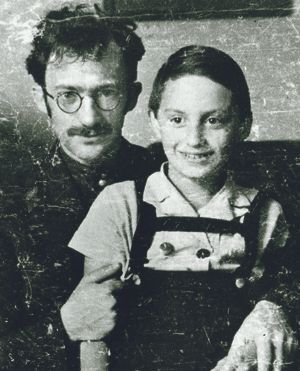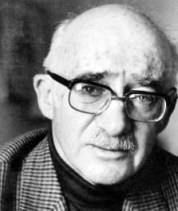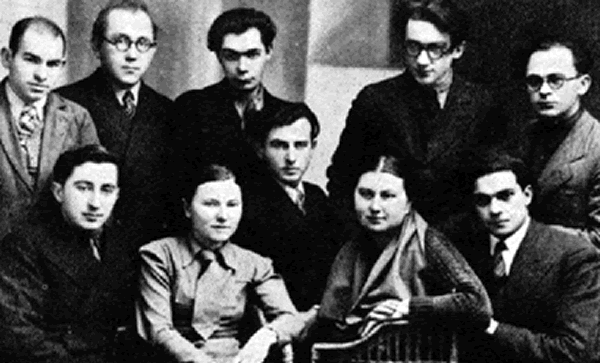The Sutzkever Family
Avrom Sutzkever, the Yiddish-language poet died January 20, 2010 at the age of 96, lived the tragedies and glories of modern Eastern European Jewish culture. Born in what today is Bielrus, he had his start as part of the Young Vilna literary movement and melted lead type into bullets in the Vilna Ghetto, from which he helped save Jewish cultural treasures, including his own manuscripts. His mother and young son were killed in the Holocaust. After the war, he was a witness at Nuremberg, and later—already a world-renowned poet—he went to Israel, where he was at the center of the Yiddish literary community and founded and edited the greatest Yiddish literary journal, Di Goldene Keyt, until its final issue, in 1995.

Sutzkever with his son Samuel
How?
How will you fill your goblet
On the day of liberation? And with what?
Are you prepared, in your joy, to endure
The dark keening you have heard
Where skulls of days glitter
In a bottomless pit?
You will search for a key to fit
You jammed locks. You will bite
The sidewalks like bread,
Thinking: It used to be better.
And time will gnaw at you like a cricket
Caught in a fist.
Then your memory will resemble
An ancient buried town
And your estranged eyes will burrow down
Like a mole, a mole….
Vilna Ghetto, February 14, 1943
Translated by Chana Bloch
The Lead Plates at the Rom Press
Arrayed at night, like fingers stretch through bars
To clutch the lit air of freedom,
We made for the press plates, to seize
The lead plates at the Rom printing works.
We were dreamers, we had to be soliders,
And melt down, for our bullets, the spirit of the lead.
At some timeless native lair
We unlocked the seal once more.
Shrouded in shadow, by the glow of a lamp,
Like Temple ancients dipping oil
Into candelabrums of festal gold,
So, pouring out line after lettered line, did we.
Letter by melting letter the lead,
Liquefied bullets, gleamed with thoughts:
A verse from Babylon, a verse from Poland,
Seething, flowing into the one mold.
Now must Jewish grit, long concealed in words,
Detonate the world in a shot!
Who in Vilna Ghetto has beheld the hands
Of Jewish heroes clasping weapons
Has beheld Jerusalem in its throes,
The crumbling of those granite walls;
Grasping the words smelted into lead,
Conning their sounds by heart.
Vilna Ghetto, September 12, 1943
Translated by Neal Kozodoy
1981
A letter arrived from the town of my birth
from one still sustained by the grace of her youth.
Enclosed between torment and fondness she pressed
a blade of grass from Ponar.
This grass and moribund cloud with its flicker
once kindled the alphabet, letter by letter.
And on the face of the letters, in murmuring ash,
the blade of grass from Ponar.
The grass is my doll’s house, my snug little world
where children play fiddles in rows as they burn.
The maestro’s a legend, they lift up their bows
for the blade of grass from Ponar.
I won’t part with this stemlet that yields up my home.
The good earth I long for makes room for us both.
And I’ll bring to the Lord my oblation at last:
the blade of grass from Ponar.
Translated by Cynthia Ozick

Yiddish
Shall I start from the beginning?
Shall I, a brother,
Like Abraham
Smash all the idols?
Shall I let myself be translated alive?
Shall I plant my tongue
And wait
Till it transforms
Into our forefathers’
Raisins and almonds?
What kind of joke
Preaches
My poetry brother with whiskers,
That soon, my mother tongue will set forever?
A hundred years from now, we still may sit here
On the Jordan, and carry on this argument.
For a question
Gnaws and paws at me:
If he knows exactly in what regions
Levi Yitzhok’s prayer,
Yehoash’s poem,
Kulbak’s song,
Are straying
To their sunset –
Could he please show me
Where the language will go down?
Maybe at the Wailing Wall?
If so, I shall come there, come,
Open my mouth,
And like a lion
Garbed in fiery scarlet,
I shall swallow the tongue as it sets.
And wake all the generations with my roar!

